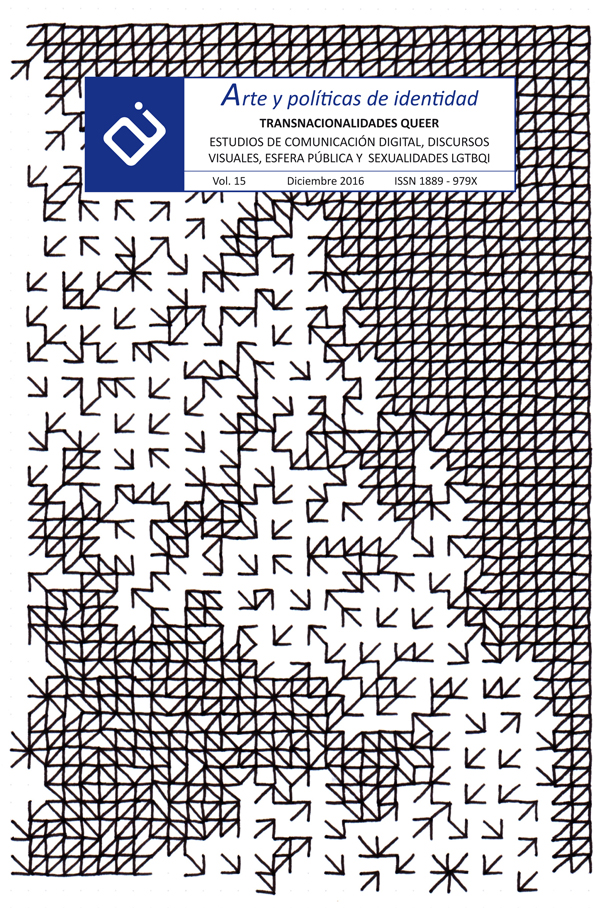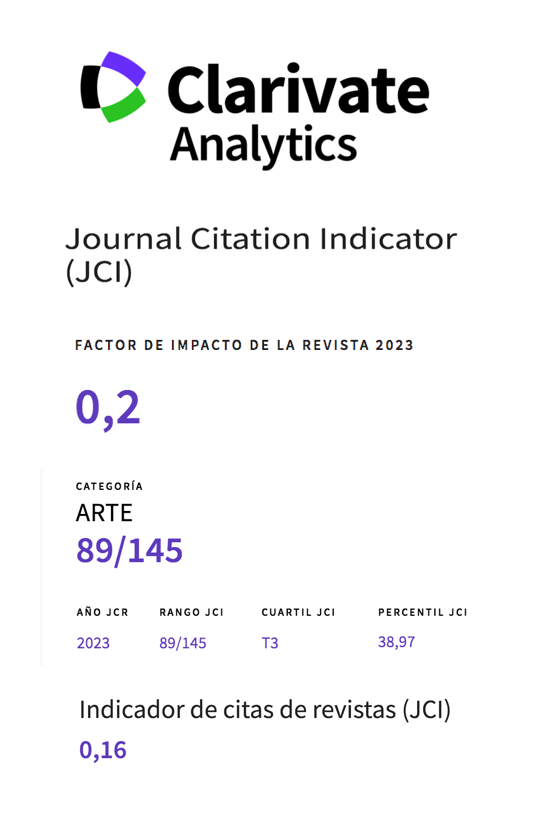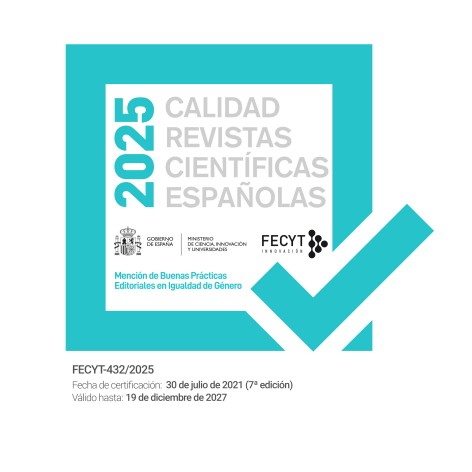Reventando cadenas: postpornografía, performance y feminismo en la obra de Nadia Granados
Resumen
Este trabajo busca indagar en la producción postpornográfica de la artista colombiana Nadia Granados quien a través de su personaje de La Fulminante, explora (y explota) la representación de la mujer latina sexualmente provocativa con la finalidad de generar intervenciones artísticas libertarias en el espacio público. Sus performances son críticas potentes acerca de los roles de género normativos, y también acerca de las violencias contra los cuerpos femenizados. Al mismo tiempo, su obra nos permite pensar en la posibilidad de recuperar la autonomía de los cuerpos femenizados a través del placer y la sexualidad. Los aportes teóricos de los que me serviré para analizar la obra de esta artista colombiana son los estudios de la performance y el feminismo decolonial. Por último, creo que es importante inscribir la obra de Granados como parte de la historia del arte feminista, donde la performance han sido muy explorada por mujeres artistas para visibilizar no sólo las violencias que atraviesan nuestros cuerpos, sino también la posibilidad de fugas y resistencia en términos de género y sexualidades.Descargas
-
Resumen1426
-
PDF764
Citas
Antivilo Peña, J. (2015). Entre lo sagrado y lo profano se tejen rebeldías. Arte feminista latinoamericano. Bogotá: Ediciones Desde Abajo.
Arcos Palma, R. (2015). Arte y política en Colombia. Dos décadas del performance y el arte acción 1990-2010. Revista Kaypunku 3(1). Lima: Estudios Interdisciplinarios de Arte y Cultura.
Butler, J. (1990). El género en disputa. Buenos Aires: Paidós (2001).
Expósito, M. (2012). La potencia de la cooperación. Diez tesis sobre el arte politizado en la nueva onda global de movimientos. Revista Errata, n°7. Bogotá: Instituto Distrital de las Artes. Edición digital. Recuperado el 13 de diciembre de 2016 de https://issuu.com/revistaerrata/docs/errata_7_creacion_colectiva_practic
Garbatzky, I. (2011). Poesía y performance. Formas de la teatralidad en la poesía de la apertura democrática rioplatense. Revista Literatura: teoría, historia, crítica. Universidad Nacional de Colombia. Edición digital. Recuperado el 13 de diciembre de 2016 de http://www.revistas.unal.edu.co/index.php/lthc/article/view/23657
Grupo autónomo a.f.r.i.k.a., L. Blisset, S. Brünzels (2006). Manual de guerrilla de la comunicación. Editorial Virus.
Lugones, M. (2008). Colonialidad y género. Hacia un feminismo descolonial. Género y descolonialidad. Buenos Aires: Ediciones del signo.
Quijaro, A. (2003). Colonialidad del poder, eurocentrismo y América Latina. En Lander (comp.) La colonialidad del saber: eurocentrismo y ciencias sociales. Perspectivas latinoamericanas. Buenos Aires: CLACSO.
Red Conceptualismos del Sur y Lucena, D. (2012). “Introducción” y “Estrategia de la alegría”, en Perder la forma humana. Una imagen sísmica de los años ochenta en América Latina. Madrid: MNCARS.
Schechner, R. (2000). Performance. Teoría y Práctica intercultural. Buenos Aires: Libros del Rojas. Schor, G. (2010). La vanguardia feminista. Una transvaloración radical. En Useros Martín, Ana (trad.). Madrid: Minerva Revista del Círculo de Bellas Artes. Edición digital. Recuperado el 13 de diciembre de 2016 dehttp://www.circulobellasartes.com/revistaminerva/articulo.php?id=613
Schor, M. (2007). Linaje paterno. En Cordero Reiman, Karen; Sáenz, Inda. Crítica feminista en la teoría e historia del arte. México: Universidad Iberoamericana.
Segato, R. (2006). Qué es un feminicidio. Notas para un debate emergente. Série Antropologia. Brasília : Departamento de Antropologia, Universidade de Brasília.
Segato, R. (2007). La Nación y sus Otros. Raza, etnicidad y diversidad religiosa en tiempos de Políticas de la Identidad. Buenos Aires: Prometeo.
Segato, R. (2011). Género y colonialidad: en buscas de claves de lectura y de un vocabulario estratégico descolonial. En Bidaseca, K. y Vazquez Laba V. Feminismos y poscolonialidad. Descolonizando el feminismo en y desde América latina. Buenos Aires: Editorial Godot.
Segato, R. (2013). La escritura en el cuerpo de las mujeres asesinadas en Ciudad Juárez Territorio, soberanía y crímenes de segundo Estado. Buenos Aires: Tinta Limón.
Taylor, D. (2012). Performance. Buenos Aires: Asunto impreso.
Zamora Betancourt, L. (2007). El imaginario femenino en el arte: Mónica Mayer, Rowena Morales y Carla Rippey. Mexico: Instituto Nacional de Bellas Artes y Literatura.
Works published in this journal are subject to the following terms:
- The Service of Publications from the University of Murcia (publishing house) keeps the published works’ copyrights, and favors and allows the reuse of these works under the license indicated in point 2.
- Works are published in the journal’s online edition under the license Creative Commons Reconocimiento-NoComercial-SinObraDerivada 3.0 España(texto legal). They can be copied, used, disseminated, transmitted and publicly exhibited, as long as: i) the author and original source of publication are cited (journal, publishing house and work’s URL); ii) they are not used for commercial purposes; iii) the existence and specifications of this license are mentioned.
3. Conditions for auto-file. It is allowed and encouraged that authors share electronically their pre-print version (the pre-reviewed version) and /or post-print version (the reviewed and accepted version) of their Works before the publication, since it promotes its circulation and dissemination. RoMEO color: green.










